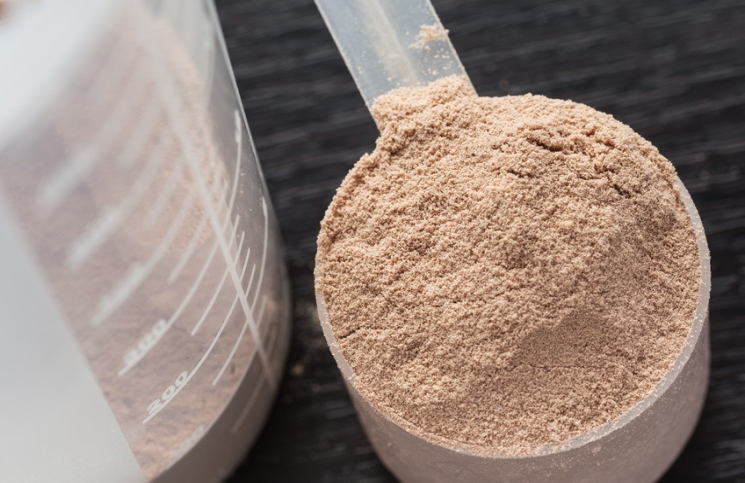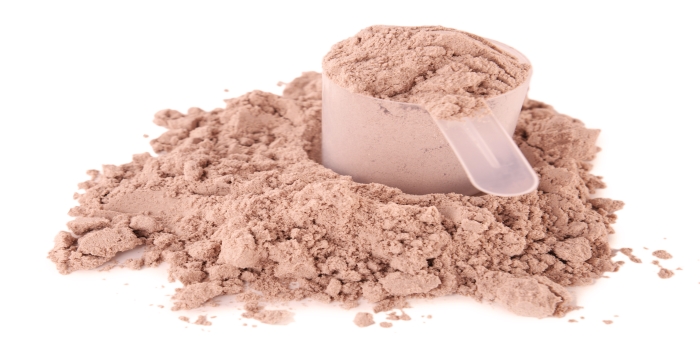Protein powders are a super-fast way to maintain a positive nitrogen balance in the body. Positive nitrogen levels help keep the body in an anabolic (muscle building) state, and are essential for anyone looking to lose fat without sacrificing muscle.
The Importance of Cost
For most people, product choices come down almost entirely to the cost factor. On one side, there are those who don’t want to spend very much, and will grab the biggest, cheapest bag or bucket of protein in the store and be perfectly happy.
Less thrifty folks will go for the protein with the prettiest packaging, the longest list of ingredients, or which makes the most promises about the results a consumer will achieve.
What Are You Using it For?
No two protein powders are made alike, though there are several variations of each.
Whey
Whey proteins are currently the most popular, and a smart choice for both bulking up and/or preserving muscle tissue while losing fat. This protein is extracted from milk, which contains approximately 20% whey.
Whey protein is fully digested by the body within an hour, making for a great pre and post-workout protein, which is also perfect for replenishing amino acid levels quickly in the morning after you’ve been asleep (fasting) for several hours.
*Timing is critical to get the most from whey, as it only stays in the body for up to 3 hours after it’s ingested.
Casein
Casein makes up for the other 80% of protein found in milk. It takes a couple of hours for this protein to fully digest and get into the bloodstream. Unlike whey, casein stays in the blood for up to 8 full hours.
Casein is perfect for people who want to stay in muscle-building mode when they can’t eat a meal, or to take before bedtime to keep those anabolic fires stoked while sleeping.
*Timing isn’t as much of an issue with casein, but it isn’t the best choice if you’re looking to replenish amino levels immediately, such as post-workout or first thing in the morning.
Egg
Egg protein powders aren’t as popular as whey or casein, primarily due to cost and taste. All the bodybuilding greats of the 60’s through to the 90’s used egg protein powders as their staple supplement.
Like casein, egg protein stays in your system for upwards of 8 hours and is one of the most complete sources of protein you’ll find anywhere. While whey and casein are all but tasteless without sweeteners being added, unsweetened egg proteins do have a distinctive taste. Most egg protein products start around double the price of milk proteins too.
*Egg starts to digest and release aminos into the blood quickly. It’s great anytime.
Vegetable
If you’re strictly vegetarian and refuse to consume dairy or eggs, vegetable-based protein powders are a decent option. There are only two types that are worthy of note: Soy and Hemp. Each has a complete amino profile, though far less of the 8 essentials than dairy, egg, or meat.
It’s important to note that Soy has phytoestrogens, which can disrupt hormones in the endocrine system in both men and women (source). Vegetable protein powders are much more expensive, per serving, than any other protein supplement on the market. Like egg, they also have a very distinctive taste that some people may find intolerable without sweetener.
*If you’re a vegan, take your vegetable protein anytime. If not, don’t waste your money on vegetable proteins. Much less bang for buck, poorer taste profile, and potential long-term health risks too.
Major Consideration: Cost-Per-Serving
You’ve now learned about the various benefits and drawbacks of the different types of protein, which is half the battle when it comes to making a smart choice. The next thing you want to be wary of is cost-per-serving. This is of particular importance when it comes to choosing whey, because of its popularity.
Always make sure you check the label to see just how many servings you’re dropping your cash down for. Don’t be swayed by the size of the container. It might seem like a 10-pound bucket of protein at $50 is a far better deal than the 2-pounder for the same price, until you realize the 10-pound option uses 4 scoops of product per serving, to the other choice’s single scoop serving size!
This often comes down to sugar content. Sugar content in each scoop a major consideration. For this reason, it’s best to avoid weight gainers, or products with a huge carb count. Sugar is cheap, but you’ll pay a premium for it when it’s used as a filler in your protein powder!
Next, you’ll want to compare how much protein you’re getting with each serving. Say you have “Product A” which costs you $0.38 per serving, and you compare it to “Product B” which rings in at a whopping $0.48 per serving. If the protein content is the same between each product, then certainly go with “A”. If “B” has twice the protein, then an extra $0.10 makes it a far better value.
Recap
• Use whey protein in the morning, when you first get up, and post-workout to recharge your amino levels and promote recovery.
• Use casein and egg protein powders anytime. Make sure you mix them with whey post-workout or first thing in the morning.
• Vegetable protein powders are fine if you don’t consume any animal products. However, they’re best avoided due to less overall amino content, higher price, poorer taste, and the potential long term health problems they may promote.




